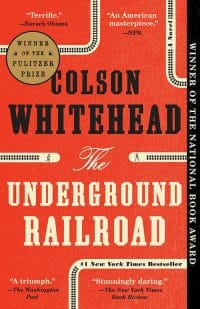She is only a human being for a tiny moment across the eternity of her servitude
 The Underground Railroad
The Underground Railroad
by Colson Whitehead
Not that I ever doubted it, but this book is excellent. It depicts many details of the awfulness of slavery while also being a highly readable adventure narrative. Please forgive the short review – this book deserves more analysis but it’s now a while since I read it and I just want to share my praise for it before I forget even more.
Cora is a slave in Georgia. She is an outcast of sorts among the slaves on the plantation, tarred by her mother’s reputation of madness and her own fierce protection of the tiny garden her mother left her. On the verge of adulthood, new threats raise their ugly head and an offer is made: does she want to attempt an escape with recently arrived slave Caesar? Her journey across America, making use of an underground railroad that is an actual railway underground, is astonishing, terrifying, entertaining and upsetting.
“Sometimes a slave will be lost in a brief eddy of liberation. In the sway of a sudden reverie among the furrows or while untangling the mysteries of an early-morning dream. In the middle of a song on a warm Sunday night. Then it comes, always – the overseer’s cry, the call to work, the shadow of the master, the reminder that she is only a human being for a tiny moment across the eternity of her servitude.”
Whitehead brilliantly evokes every setting – the slave village on the plantation, the platforms at each stop of the railroad, the towns and remote farms Cora passes through – and how Cora is changed by each place. Some people and places give her hope, others tear it away.
One of the quotes on the cover of my copy is “wildly inventive”. While Whitehead has obviously used a certain degree of invention, what is wild is that the truth hasn’t been stretched all that far. A little imagination gives the historical truth a grotesque quality, the very real horrors seen through the lens of the horror genre.
“Much of what they said could apply to any former slave who overheard them. A plantation was a plantation; one might think one’s misfortunes distinct, but the true horror lay in their universality. In any event, the music would soon cover their talk of the underground railroad. Cora hoped the musicians wouldn’t think them rude for their inattention. It was unlikely. Playing their music as freemen and not chattel was probably still a cherished novelty. To attack the melody without the burden of providing one of the sole comforts of their slave village. To practice their art with liberty and joy.”
Something I learned from this novel, because of the way it is emphasised by Whitehead, is the difference between states in the way slaves and former slaves were treated. I found myself googling a lot of the details to find out what was true and what was invented. I also realised for the first time that the flight of escaped slaves being chased by slave catchers shares a lot in common with the many Holocaust narratives I have read – hiding in tiny spaces, false names and papers, trying to pass as other people with other backgrounds. I clearly need to read some historical slave narratives.
Published 2016 by Doubleday.
Source: Foyles.